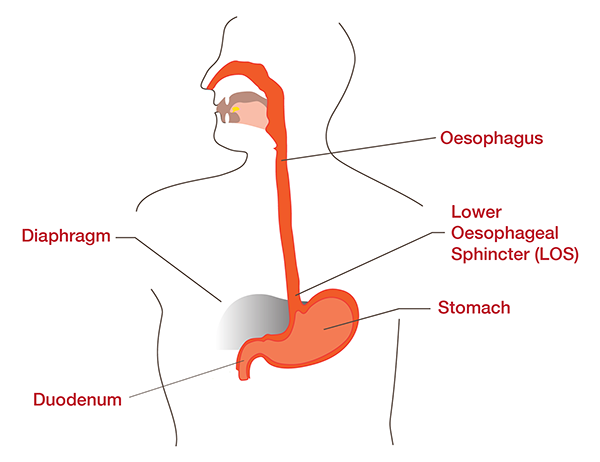Let's stay in touch
Keep in touch with us and stay up to date with latest in the world of healthcare and gut health!
GORD (or GERD in the US) is an abbreviation for Gastro-Oesophageal Reflux Disease.
Gastro-Oesophageal is just a scientific way to describe your stomach (gastro) and the ‘pipe’ that connects it to your mouth (oesophagus).
Acid reflux or heartburn is a burning pain felt in the chest and sometimes back of the throat, caused by stomach acid flowing back up your oesophagus, irritating its lining.
Sometimes the condition is simply called indigestion.
In addition to the burning pain or sensation in the chest or throat, some people suffer from excessive burping or a sore throat (or hoarseness). It can even cause night time or early morning coughing.
Reflux or heartburn is relatively common and many of us experience it from time to time. However, if the reflux occurs more than twice a week, it is considered to be GORD/GERD, and it could indicate that there is an underlying problem. If untreated, it could lead to more serious health problems and impact well-being and quality of life.
In most cases, some medication and lifestyle changes (see treatment below) can help alleviate symptoms, but for some people, ignoring GORD can lead to complications such as oesophageal ulcers or oesophageal stricture.
In the case of oesophageal ulcers, the lining of the oesophagus is damaged by the excess acid. These ulcers can bleed, cause pain and make swallowing difficult.
An oesophageal stricture occurs when the lining damage causes the formation of scar tissue that builds up, narrowing or constricting the oesophagus. This makes swallowing difficult and potentially painful. A stricture may require surgery to remove scar tissue and restore the width of the oesophagus.

The most common cause of gastro-oesophageal reflux is an issue with the lower oesophageal sphincter (LOS), the ‘valve’ that allows food to move through to the stomach and then closes to prevent stomach acid rising up.
If the sphincter relaxes abnormally or is somehow weakened in strength, stomach acid can flow up your oesophagus, causing the pain of heartburn. This tends to happen more when you bend over or lie down.
Sometimes the reflux is caused by a physical issue called a hiatus hernia, a condition in which the stomach bulges up into the chest cavity through an opening in your diaphragm muscle. This hernia compromises the ability of the sphincter to prevent acid flowing up.
If you suffer from reflux more than twice weekly and suspect GORD, you should seek medical advice. Long term use of other counter medications (eg antacids and H2 antagonists such as ranitidine, or Proton Pump Inhibitors or PPIs) is not recommended.
Your healthcare professional will also no doubt recommend changes to your lifestyle and/or diet to reduce the risk factors for reflux and GORD. For example:
GORD Awareness Week
November 17 – 23, 2020


SAMe is a compound best known for its antidepressant action. In this article, we seek to touch on the significant body of evidence that supports


Ingredients (4 serves):• 500g carrots, grated. (Ideally organic)• ½ red onion, finely sliced• Zest & juice of 1 lemon• 2 tsp toasted cumin seeds• 2cm




观看由创办人 Ian Brighthope教授为大家回顾了 Nutrition Care 的历史,並向大家保证将会继续坚持纯自然和更专业的理念,为世界人们提供高质量的保健品。


2018年4月26日,Nutrition Care在墨尔本举办庆典庆祝品牌创立40周年。 Nutrition Care是澳洲著名的保健品生产商,其创立于1978年,40年来一直致力于减少药品的使用。而此次40周年庆典的主题——自然更专业,也是他们长久以来希望传达给消费者的理念。26日下午1点半,Nutrition Care的40周年庆在墨尔本的Crown正式拉开序幕。 (著名主持人李维嘉,品牌创始人Ian Brighthope,澳洲名模Lauren Vickers) 此次庆典上,Nutrition


5月13日,Nutrition Care首次冠名全澳大学生华语辩论赛——NC纽新宝杯决赛于墨尔本市政厅成功举行! 本次辩论赛由澳洲著名保健品品牌NC纽新宝独家冠名,活动到场嘉宾有中国驻墨尔本总领事馆教育组杨智勇领事,本次评委阵容亦相当强大,其中就包括《奇葩说》著名辩手陈铭与胡渐彪 。 决赛双方分别是莫纳什大学中文辩论社和墨尔本大学中华辩论社,双方就【消费主义是当代灵魂的良药还是毒药】这一辩题,站在不同的角度,深度剖析。 最终,莫纳什大学代表队的表现获得了评委们的一致青睐,夺得本届全澳辩论赛中冠军。 比赛结束后,胡渐彪评委深入浅出解读【良药】【毒药】的定义,给辩手和台下观众们带来更深层次的思考。徐卓阳评委更是以赞助商NC纽新宝在台上的养胃粉为例,幽默而又直观地对话题进行了概括,通俗易懂,却又发人深思。Nutrition Care品牌创始人Ian Brighthope虽不能亲自到场,但特意录制了一段祝贺视频给参赛选手们。视频中Ian教授感谢选手们的付出,在母亲节这样特殊的日子里,他提醒远离家人的留学生们,要注意自己的身体健康,因为健康对他们而言,是在异乡追逐人生梦想最重要的急事之一。 最後,NC纽新宝为嘉宾、评委们以及每一位前来参加活动的观众准备了养胃小礼物,让大家在观 看辩论赛时感到暖心暖胃。
Keep in touch with us and stay up to date with latest in the world of healthcare and gut health!
| Cookie | Duration | Description |
|---|---|---|
| cookielawinfo-checkbox-analytics | 11 months | This cookie is set by GDPR Cookie Consent plugin. The cookie is used to store the user consent for the cookies in the category "Analytics". |
| cookielawinfo-checkbox-functional | 11 months | The cookie is set by GDPR cookie consent to record the user consent for the cookies in the category "Functional". |
| cookielawinfo-checkbox-necessary | 11 months | This cookie is set by GDPR Cookie Consent plugin. The cookies is used to store the user consent for the cookies in the category "Necessary". |
| cookielawinfo-checkbox-others | 11 months | This cookie is set by GDPR Cookie Consent plugin. The cookie is used to store the user consent for the cookies in the category "Other. |
| cookielawinfo-checkbox-performance | 11 months | This cookie is set by GDPR Cookie Consent plugin. The cookie is used to store the user consent for the cookies in the category "Performance". |
| viewed_cookie_policy | 11 months | The cookie is set by the GDPR Cookie Consent plugin and is used to store whether or not user has consented to the use of cookies. It does not store any personal data. |




Get free shipping on your first order* when you enter your details below.
*A minimum purchase of $25 is required. Always read the labeland follow the directions for use.